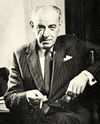Colonel Charles Russell
Authors [about]:
join in to develop this article! |
Colonel Charles Edward Russell, generally known as Colonel Russell, is an Anglo-Irish British army officer created by the British thriller writer William Haggard who, after World War II, becomes head of an unobtrusive but occasionally lethal British counter-intelligence agency called the Security Executive. The Executive figures in 25 novels featuring Russell and in several others in which Russell is not a character. Haggard himself, who had served at least for a while as an Intelligence Officer during the War, called it "not entirely imaginary". Russell is presented throughout the series as an "unapologetic" Establishment conservative but, perhaps because of his part-Irish heritage, is far from being a racist: in at least one of his books, he hopes that a Black "operator" of the Executive, William Wilberforce Smith, will become its head.
We learn in Slow Burner, the first Russell book, that he is unmarried and "not particularly tall" but that "his stride was an inch or two longer than the average, an inch or two longer than an infantryman of the line would have felt comfortable". In spite of his age, his golf handicap is two, and he has fairly recently competed in the British Amateur. "As a younger man, he had driven in competitions" and still drives fast but safely. He has "an abundant mustache"; drinks sherry or whisky and soda before lunch; might have some port before going to an early afternoon important meeting, but more to delay his arrival than because he wants or needs it. He smokes a pipe and occasional cigar but by the 21st book he has given up smoking. "By the standards of conformity" his office furnishings and decorations are an eclectic mix, a "scandal". To help his thinking about a problem, he writes an APPRECIATION in long hand, arranged things in categories. his chief assistant is Major Mortimer. "Malice or resentment were emotions unknown to him... he was aware that he had an excellent brain... lucid, even a little elegant. But quite, quite wrong. And Mortimer had been entirely right... In his mental register he entered the matter as Lesson Learned; he entered it to the already formidable credit of Experience."
Sources
- Encyclopedia of Mystery and Detection, Chris Steinbrunner and Otto Penzler, McGraw-Hill Book Company, New York, 1976, ISBN 0-07-061121-1
- Twentieth Century Crime and Mystery Writers, edited by John M. Reilly, St. Martins Press, New York, 1980, ISBN 0-312-82417-3
- Who's Who in Spy Fiction, Donald McCormick, Sphere Books Limited, London, 1979
References
